UTS Taxation Law Research Assignment: Income, Deductions, and CGT
VerifiedAdded on 2022/10/17
|8
|1795
|488
Homework Assignment
AI Summary
This assignment analyzes Jane's tax situation as a full-time interior design consultant. It addresses whether her salary and income from teaching are assessable income, deductibility of travel expenses, home office expenses, membership subscriptions, fringe benefits tax on a laptop, travel expenses between office and client locations, clothing expenses, and expenses for traveling between a community college and office. The assignment also evaluates the capital gains tax (CGT) implications of selling a yacht and antique furniture, considering relevant sections of the Income Tax Assessment Act 1997 and the Fringe Benefit Taxation Assessment Act 1986. The solution applies relevant case law and tax rulings, including Lunney v. FCT, Handley v. Federal Commissioner of Taxation, and Taxation Ruling TR 97/12, to determine the tax consequences of various expenses and transactions. The analysis includes calculations for capital gains and deductions, providing a comprehensive overview of Jane's tax liabilities and entitlements.
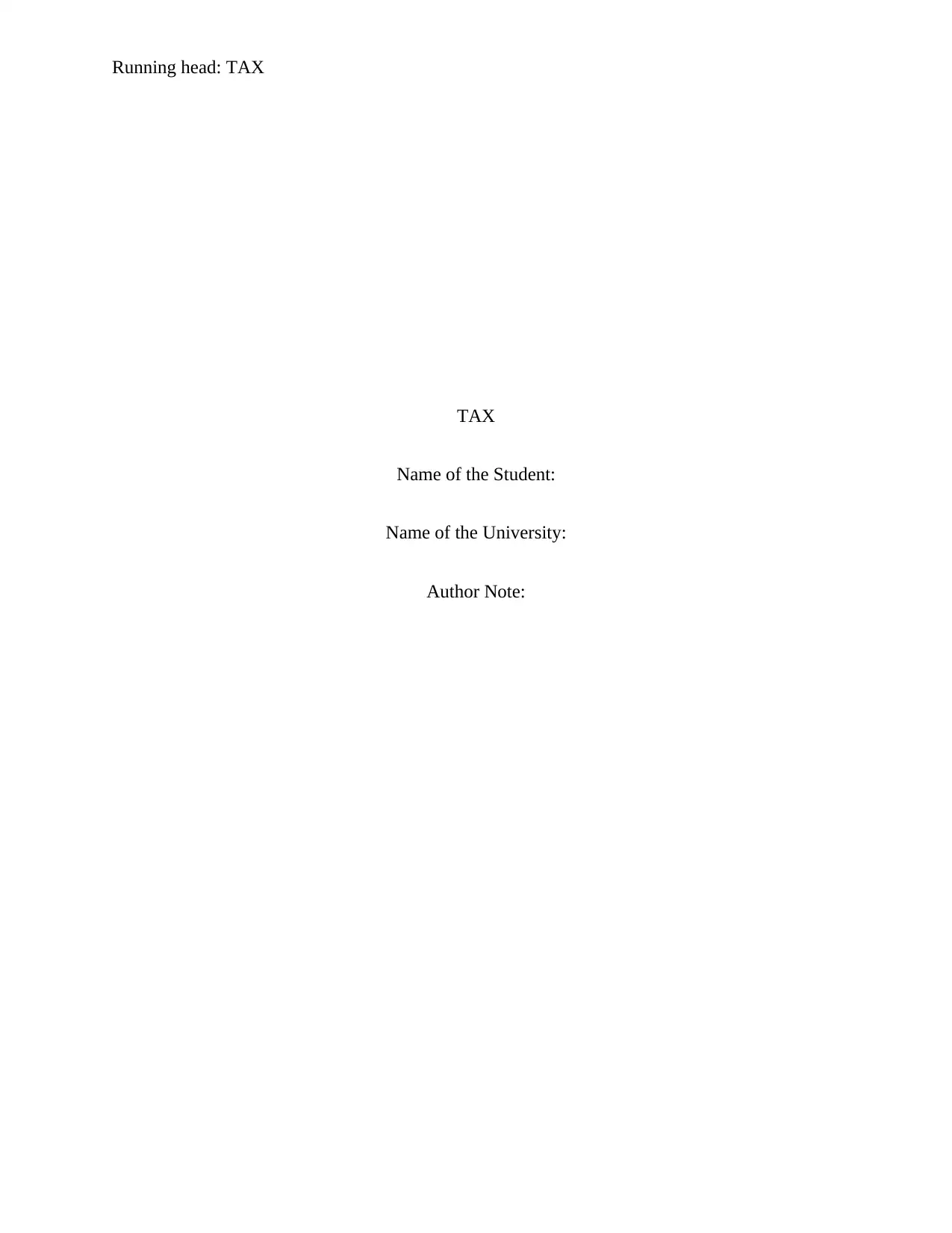
Running head: TAX
TAX
Name of the Student:
Name of the University:
Author Note:
TAX
Name of the Student:
Name of the University:
Author Note:
Paraphrase This Document
Need a fresh take? Get an instant paraphrase of this document with our AI Paraphraser
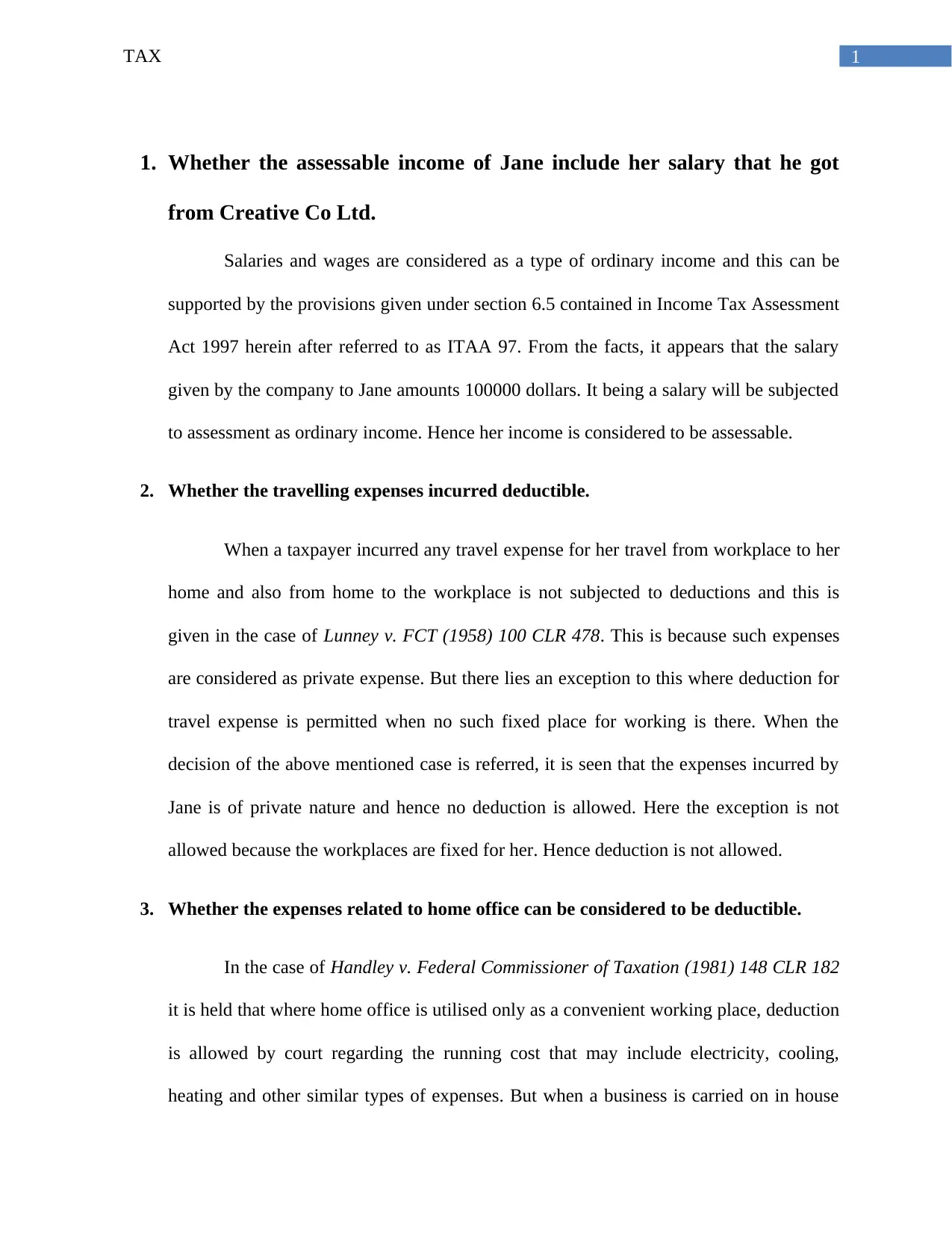
1TAX
1. Whether the assessable income of Jane include her salary that he got
from Creative Co Ltd.
Salaries and wages are considered as a type of ordinary income and this can be
supported by the provisions given under section 6.5 contained in Income Tax Assessment
Act 1997 herein after referred to as ITAA 97. From the facts, it appears that the salary
given by the company to Jane amounts 100000 dollars. It being a salary will be subjected
to assessment as ordinary income. Hence her income is considered to be assessable.
2. Whether the travelling expenses incurred deductible.
When a taxpayer incurred any travel expense for her travel from workplace to her
home and also from home to the workplace is not subjected to deductions and this is
given in the case of Lunney v. FCT (1958) 100 CLR 478. This is because such expenses
are considered as private expense. But there lies an exception to this where deduction for
travel expense is permitted when no such fixed place for working is there. When the
decision of the above mentioned case is referred, it is seen that the expenses incurred by
Jane is of private nature and hence no deduction is allowed. Here the exception is not
allowed because the workplaces are fixed for her. Hence deduction is not allowed.
3. Whether the expenses related to home office can be considered to be deductible.
In the case of Handley v. Federal Commissioner of Taxation (1981) 148 CLR 182
it is held that where home office is utilised only as a convenient working place, deduction
is allowed by court regarding the running cost that may include electricity, cooling,
heating and other similar types of expenses. But when a business is carried on in house
1. Whether the assessable income of Jane include her salary that he got
from Creative Co Ltd.
Salaries and wages are considered as a type of ordinary income and this can be
supported by the provisions given under section 6.5 contained in Income Tax Assessment
Act 1997 herein after referred to as ITAA 97. From the facts, it appears that the salary
given by the company to Jane amounts 100000 dollars. It being a salary will be subjected
to assessment as ordinary income. Hence her income is considered to be assessable.
2. Whether the travelling expenses incurred deductible.
When a taxpayer incurred any travel expense for her travel from workplace to her
home and also from home to the workplace is not subjected to deductions and this is
given in the case of Lunney v. FCT (1958) 100 CLR 478. This is because such expenses
are considered as private expense. But there lies an exception to this where deduction for
travel expense is permitted when no such fixed place for working is there. When the
decision of the above mentioned case is referred, it is seen that the expenses incurred by
Jane is of private nature and hence no deduction is allowed. Here the exception is not
allowed because the workplaces are fixed for her. Hence deduction is not allowed.
3. Whether the expenses related to home office can be considered to be deductible.
In the case of Handley v. Federal Commissioner of Taxation (1981) 148 CLR 182
it is held that where home office is utilised only as a convenient working place, deduction
is allowed by court regarding the running cost that may include electricity, cooling,
heating and other similar types of expenses. But when a business is carried on in house
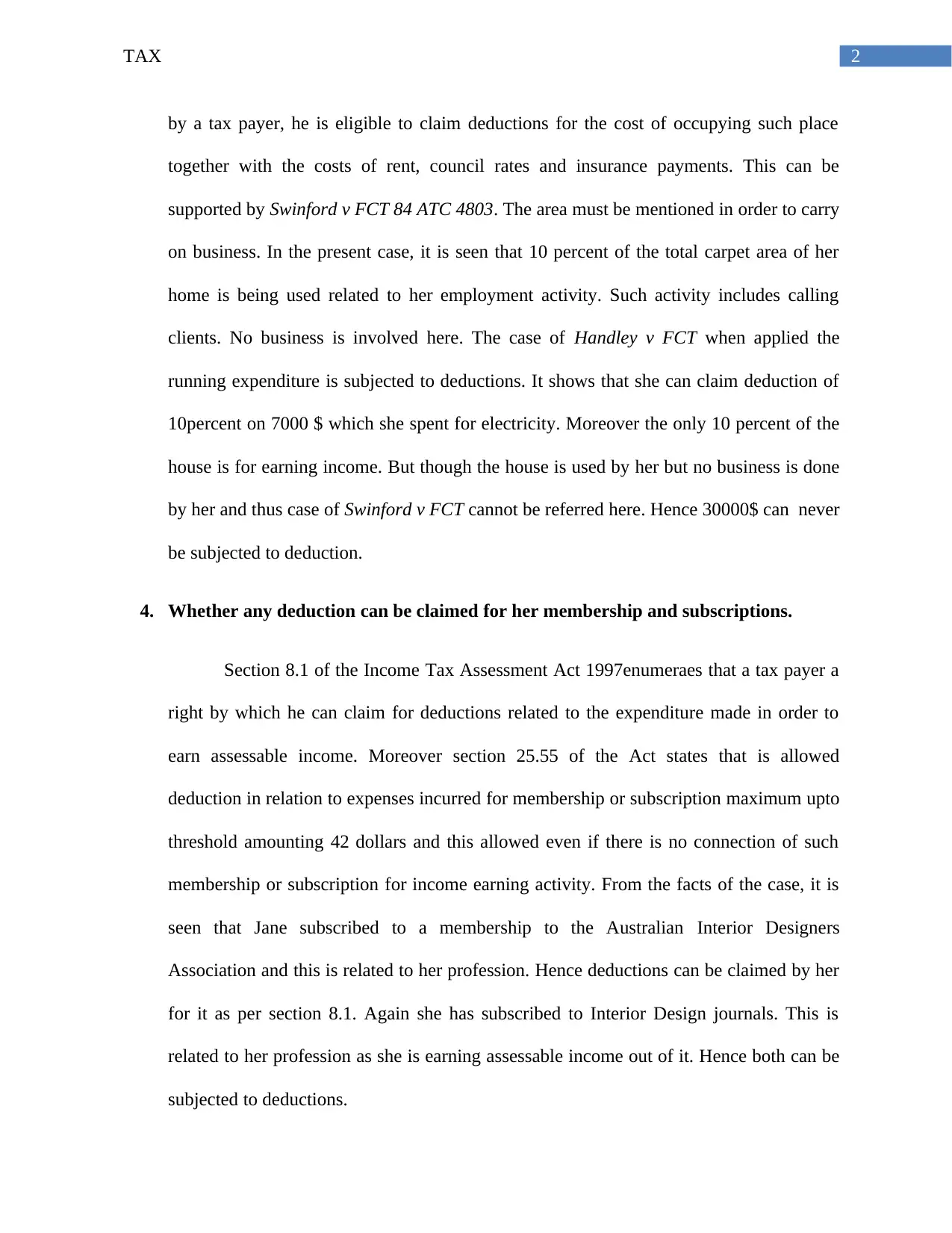
2TAX
by a tax payer, he is eligible to claim deductions for the cost of occupying such place
together with the costs of rent, council rates and insurance payments. This can be
supported by Swinford v FCT 84 ATC 4803. The area must be mentioned in order to carry
on business. In the present case, it is seen that 10 percent of the total carpet area of her
home is being used related to her employment activity. Such activity includes calling
clients. No business is involved here. The case of Handley v FCT when applied the
running expenditure is subjected to deductions. It shows that she can claim deduction of
10percent on 7000 $ which she spent for electricity. Moreover the only 10 percent of the
house is for earning income. But though the house is used by her but no business is done
by her and thus case of Swinford v FCT cannot be referred here. Hence 30000$ can never
be subjected to deduction.
4. Whether any deduction can be claimed for her membership and subscriptions.
Section 8.1 of the Income Tax Assessment Act 1997enumeraes that a tax payer a
right by which he can claim for deductions related to the expenditure made in order to
earn assessable income. Moreover section 25.55 of the Act states that is allowed
deduction in relation to expenses incurred for membership or subscription maximum upto
threshold amounting 42 dollars and this allowed even if there is no connection of such
membership or subscription for income earning activity. From the facts of the case, it is
seen that Jane subscribed to a membership to the Australian Interior Designers
Association and this is related to her profession. Hence deductions can be claimed by her
for it as per section 8.1. Again she has subscribed to Interior Design journals. This is
related to her profession as she is earning assessable income out of it. Hence both can be
subjected to deductions.
by a tax payer, he is eligible to claim deductions for the cost of occupying such place
together with the costs of rent, council rates and insurance payments. This can be
supported by Swinford v FCT 84 ATC 4803. The area must be mentioned in order to carry
on business. In the present case, it is seen that 10 percent of the total carpet area of her
home is being used related to her employment activity. Such activity includes calling
clients. No business is involved here. The case of Handley v FCT when applied the
running expenditure is subjected to deductions. It shows that she can claim deduction of
10percent on 7000 $ which she spent for electricity. Moreover the only 10 percent of the
house is for earning income. But though the house is used by her but no business is done
by her and thus case of Swinford v FCT cannot be referred here. Hence 30000$ can never
be subjected to deduction.
4. Whether any deduction can be claimed for her membership and subscriptions.
Section 8.1 of the Income Tax Assessment Act 1997enumeraes that a tax payer a
right by which he can claim for deductions related to the expenditure made in order to
earn assessable income. Moreover section 25.55 of the Act states that is allowed
deduction in relation to expenses incurred for membership or subscription maximum upto
threshold amounting 42 dollars and this allowed even if there is no connection of such
membership or subscription for income earning activity. From the facts of the case, it is
seen that Jane subscribed to a membership to the Australian Interior Designers
Association and this is related to her profession. Hence deductions can be claimed by her
for it as per section 8.1. Again she has subscribed to Interior Design journals. This is
related to her profession as she is earning assessable income out of it. Hence both can be
subjected to deductions.
⊘ This is a preview!⊘
Do you want full access?
Subscribe today to unlock all pages.

Trusted by 1+ million students worldwide
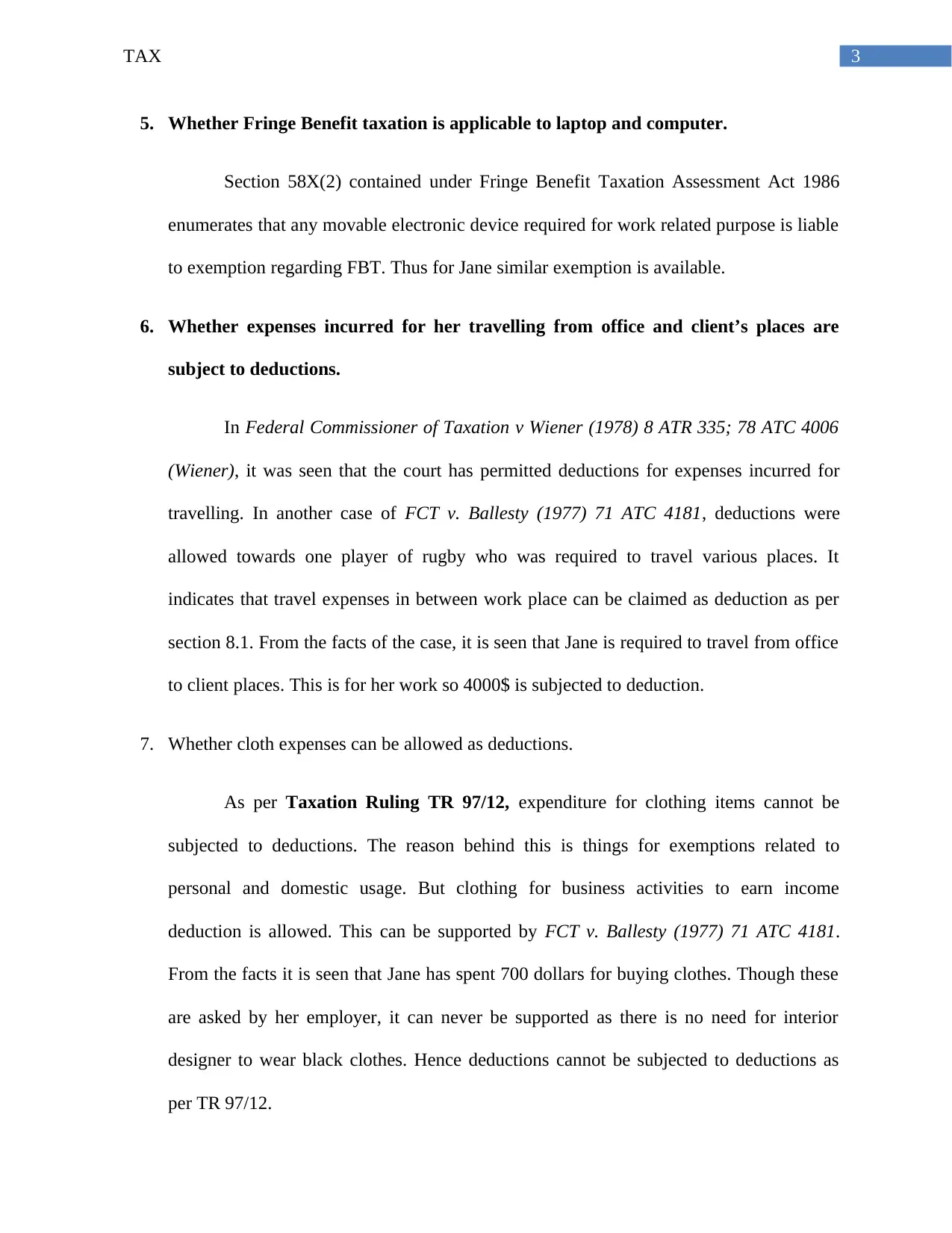
3TAX
5. Whether Fringe Benefit taxation is applicable to laptop and computer.
Section 58X(2) contained under Fringe Benefit Taxation Assessment Act 1986
enumerates that any movable electronic device required for work related purpose is liable
to exemption regarding FBT. Thus for Jane similar exemption is available.
6. Whether expenses incurred for her travelling from office and client’s places are
subject to deductions.
In Federal Commissioner of Taxation v Wiener (1978) 8 ATR 335; 78 ATC 4006
(Wiener), it was seen that the court has permitted deductions for expenses incurred for
travelling. In another case of FCT v. Ballesty (1977) 71 ATC 4181, deductions were
allowed towards one player of rugby who was required to travel various places. It
indicates that travel expenses in between work place can be claimed as deduction as per
section 8.1. From the facts of the case, it is seen that Jane is required to travel from office
to client places. This is for her work so 4000$ is subjected to deduction.
7. Whether cloth expenses can be allowed as deductions.
As per Taxation Ruling TR 97/12, expenditure for clothing items cannot be
subjected to deductions. The reason behind this is things for exemptions related to
personal and domestic usage. But clothing for business activities to earn income
deduction is allowed. This can be supported by FCT v. Ballesty (1977) 71 ATC 4181.
From the facts it is seen that Jane has spent 700 dollars for buying clothes. Though these
are asked by her employer, it can never be supported as there is no need for interior
designer to wear black clothes. Hence deductions cannot be subjected to deductions as
per TR 97/12.
5. Whether Fringe Benefit taxation is applicable to laptop and computer.
Section 58X(2) contained under Fringe Benefit Taxation Assessment Act 1986
enumerates that any movable electronic device required for work related purpose is liable
to exemption regarding FBT. Thus for Jane similar exemption is available.
6. Whether expenses incurred for her travelling from office and client’s places are
subject to deductions.
In Federal Commissioner of Taxation v Wiener (1978) 8 ATR 335; 78 ATC 4006
(Wiener), it was seen that the court has permitted deductions for expenses incurred for
travelling. In another case of FCT v. Ballesty (1977) 71 ATC 4181, deductions were
allowed towards one player of rugby who was required to travel various places. It
indicates that travel expenses in between work place can be claimed as deduction as per
section 8.1. From the facts of the case, it is seen that Jane is required to travel from office
to client places. This is for her work so 4000$ is subjected to deduction.
7. Whether cloth expenses can be allowed as deductions.
As per Taxation Ruling TR 97/12, expenditure for clothing items cannot be
subjected to deductions. The reason behind this is things for exemptions related to
personal and domestic usage. But clothing for business activities to earn income
deduction is allowed. This can be supported by FCT v. Ballesty (1977) 71 ATC 4181.
From the facts it is seen that Jane has spent 700 dollars for buying clothes. Though these
are asked by her employer, it can never be supported as there is no need for interior
designer to wear black clothes. Hence deductions cannot be subjected to deductions as
per TR 97/12.
Paraphrase This Document
Need a fresh take? Get an instant paraphrase of this document with our AI Paraphraser
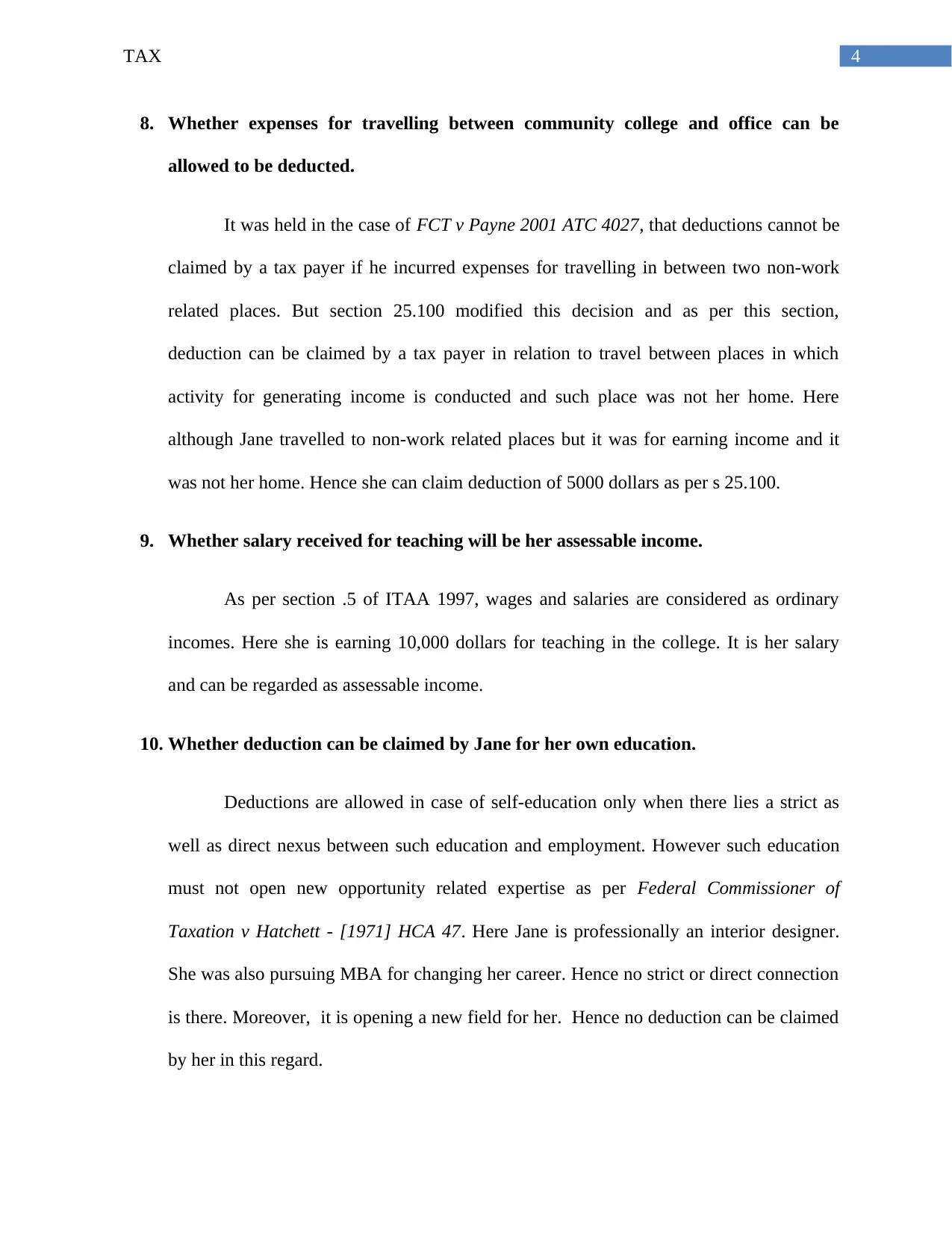
4TAX
8. Whether expenses for travelling between community college and office can be
allowed to be deducted.
It was held in the case of FCT v Payne 2001 ATC 4027, that deductions cannot be
claimed by a tax payer if he incurred expenses for travelling in between two non-work
related places. But section 25.100 modified this decision and as per this section,
deduction can be claimed by a tax payer in relation to travel between places in which
activity for generating income is conducted and such place was not her home. Here
although Jane travelled to non-work related places but it was for earning income and it
was not her home. Hence she can claim deduction of 5000 dollars as per s 25.100.
9. Whether salary received for teaching will be her assessable income.
As per section .5 of ITAA 1997, wages and salaries are considered as ordinary
incomes. Here she is earning 10,000 dollars for teaching in the college. It is her salary
and can be regarded as assessable income.
10. Whether deduction can be claimed by Jane for her own education.
Deductions are allowed in case of self-education only when there lies a strict as
well as direct nexus between such education and employment. However such education
must not open new opportunity related expertise as per Federal Commissioner of
Taxation v Hatchett - [1971] HCA 47. Here Jane is professionally an interior designer.
She was also pursuing MBA for changing her career. Hence no strict or direct connection
is there. Moreover, it is opening a new field for her. Hence no deduction can be claimed
by her in this regard.
8. Whether expenses for travelling between community college and office can be
allowed to be deducted.
It was held in the case of FCT v Payne 2001 ATC 4027, that deductions cannot be
claimed by a tax payer if he incurred expenses for travelling in between two non-work
related places. But section 25.100 modified this decision and as per this section,
deduction can be claimed by a tax payer in relation to travel between places in which
activity for generating income is conducted and such place was not her home. Here
although Jane travelled to non-work related places but it was for earning income and it
was not her home. Hence she can claim deduction of 5000 dollars as per s 25.100.
9. Whether salary received for teaching will be her assessable income.
As per section .5 of ITAA 1997, wages and salaries are considered as ordinary
incomes. Here she is earning 10,000 dollars for teaching in the college. It is her salary
and can be regarded as assessable income.
10. Whether deduction can be claimed by Jane for her own education.
Deductions are allowed in case of self-education only when there lies a strict as
well as direct nexus between such education and employment. However such education
must not open new opportunity related expertise as per Federal Commissioner of
Taxation v Hatchett - [1971] HCA 47. Here Jane is professionally an interior designer.
She was also pursuing MBA for changing her career. Hence no strict or direct connection
is there. Moreover, it is opening a new field for her. Hence no deduction can be claimed
by her in this regard.
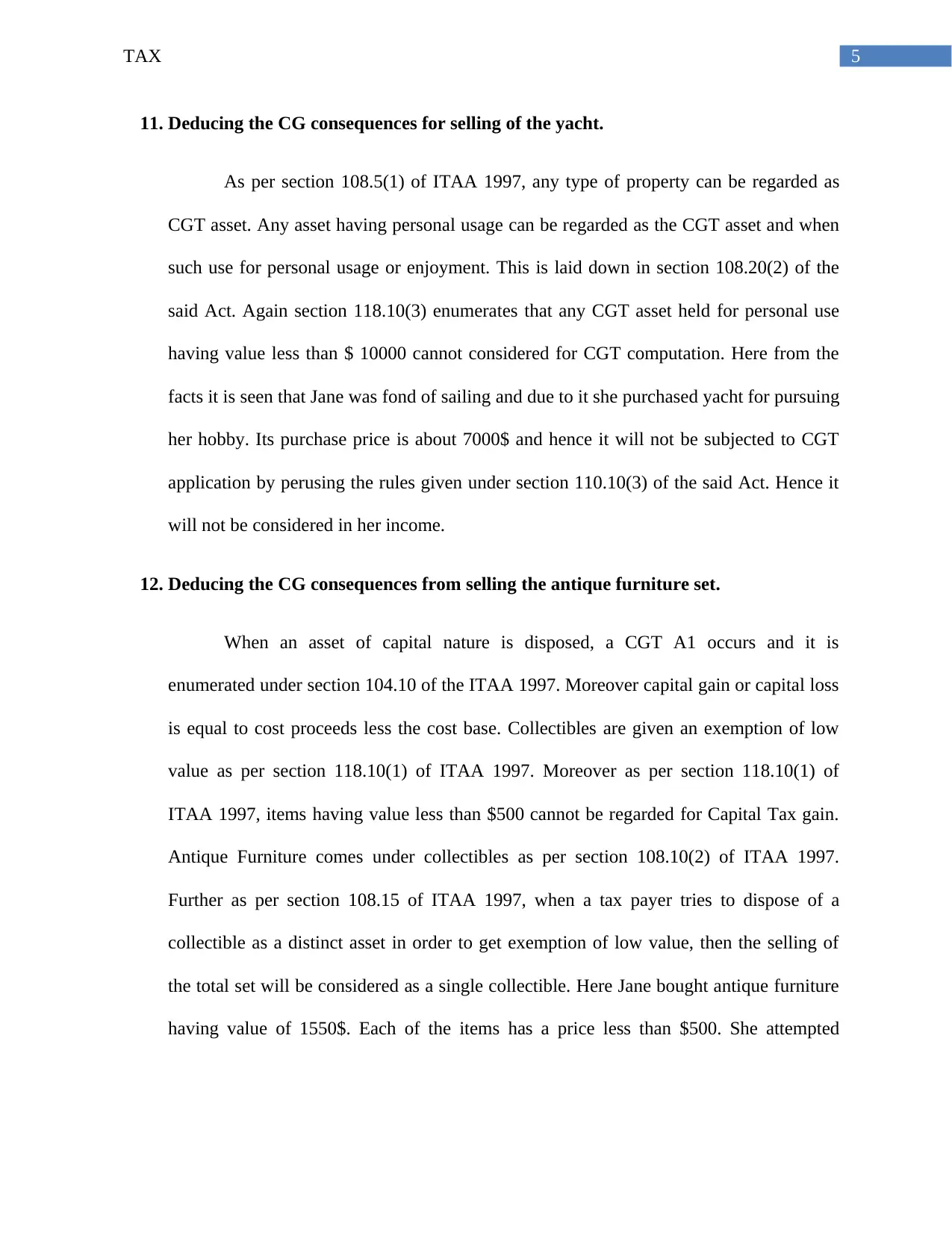
5TAX
11. Deducing the CG consequences for selling of the yacht.
As per section 108.5(1) of ITAA 1997, any type of property can be regarded as
CGT asset. Any asset having personal usage can be regarded as the CGT asset and when
such use for personal usage or enjoyment. This is laid down in section 108.20(2) of the
said Act. Again section 118.10(3) enumerates that any CGT asset held for personal use
having value less than $ 10000 cannot considered for CGT computation. Here from the
facts it is seen that Jane was fond of sailing and due to it she purchased yacht for pursuing
her hobby. Its purchase price is about 7000$ and hence it will not be subjected to CGT
application by perusing the rules given under section 110.10(3) of the said Act. Hence it
will not be considered in her income.
12. Deducing the CG consequences from selling the antique furniture set.
When an asset of capital nature is disposed, a CGT A1 occurs and it is
enumerated under section 104.10 of the ITAA 1997. Moreover capital gain or capital loss
is equal to cost proceeds less the cost base. Collectibles are given an exemption of low
value as per section 118.10(1) of ITAA 1997. Moreover as per section 118.10(1) of
ITAA 1997, items having value less than $500 cannot be regarded for Capital Tax gain.
Antique Furniture comes under collectibles as per section 108.10(2) of ITAA 1997.
Further as per section 108.15 of ITAA 1997, when a tax payer tries to dispose of a
collectible as a distinct asset in order to get exemption of low value, then the selling of
the total set will be considered as a single collectible. Here Jane bought antique furniture
having value of 1550$. Each of the items has a price less than $500. She attempted
11. Deducing the CG consequences for selling of the yacht.
As per section 108.5(1) of ITAA 1997, any type of property can be regarded as
CGT asset. Any asset having personal usage can be regarded as the CGT asset and when
such use for personal usage or enjoyment. This is laid down in section 108.20(2) of the
said Act. Again section 118.10(3) enumerates that any CGT asset held for personal use
having value less than $ 10000 cannot considered for CGT computation. Here from the
facts it is seen that Jane was fond of sailing and due to it she purchased yacht for pursuing
her hobby. Its purchase price is about 7000$ and hence it will not be subjected to CGT
application by perusing the rules given under section 110.10(3) of the said Act. Hence it
will not be considered in her income.
12. Deducing the CG consequences from selling the antique furniture set.
When an asset of capital nature is disposed, a CGT A1 occurs and it is
enumerated under section 104.10 of the ITAA 1997. Moreover capital gain or capital loss
is equal to cost proceeds less the cost base. Collectibles are given an exemption of low
value as per section 118.10(1) of ITAA 1997. Moreover as per section 118.10(1) of
ITAA 1997, items having value less than $500 cannot be regarded for Capital Tax gain.
Antique Furniture comes under collectibles as per section 108.10(2) of ITAA 1997.
Further as per section 108.15 of ITAA 1997, when a tax payer tries to dispose of a
collectible as a distinct asset in order to get exemption of low value, then the selling of
the total set will be considered as a single collectible. Here Jane bought antique furniture
having value of 1550$. Each of the items has a price less than $500. She attempted
⊘ This is a preview!⊘
Do you want full access?
Subscribe today to unlock all pages.

Trusted by 1+ million students worldwide
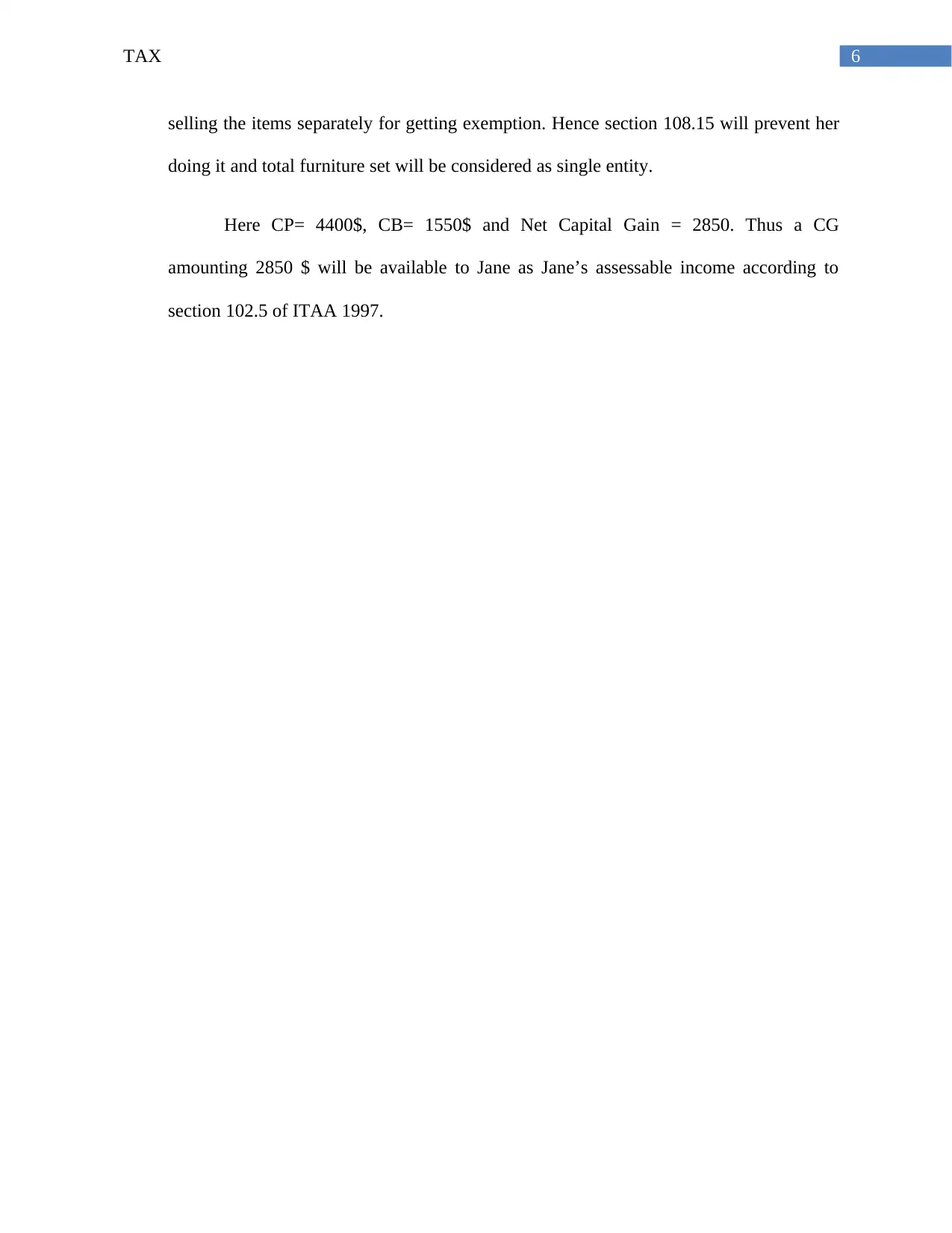
6TAX
selling the items separately for getting exemption. Hence section 108.15 will prevent her
doing it and total furniture set will be considered as single entity.
Here CP= 4400$, CB= 1550$ and Net Capital Gain = 2850. Thus a CG
amounting 2850 $ will be available to Jane as Jane’s assessable income according to
section 102.5 of ITAA 1997.
selling the items separately for getting exemption. Hence section 108.15 will prevent her
doing it and total furniture set will be considered as single entity.
Here CP= 4400$, CB= 1550$ and Net Capital Gain = 2850. Thus a CG
amounting 2850 $ will be available to Jane as Jane’s assessable income according to
section 102.5 of ITAA 1997.
Paraphrase This Document
Need a fresh take? Get an instant paraphrase of this document with our AI Paraphraser
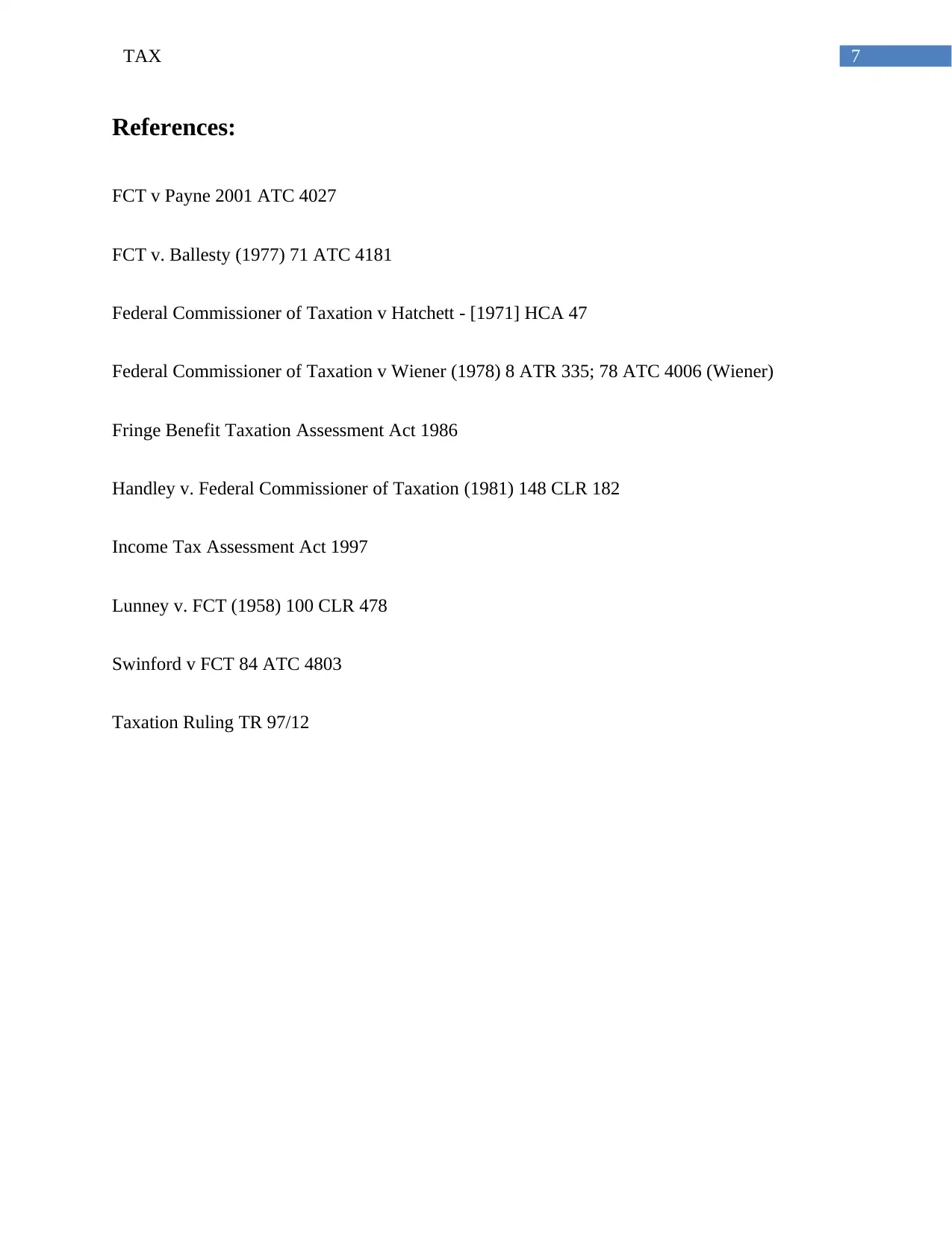
7TAX
References:
FCT v Payne 2001 ATC 4027
FCT v. Ballesty (1977) 71 ATC 4181
Federal Commissioner of Taxation v Hatchett - [1971] HCA 47
Federal Commissioner of Taxation v Wiener (1978) 8 ATR 335; 78 ATC 4006 (Wiener)
Fringe Benefit Taxation Assessment Act 1986
Handley v. Federal Commissioner of Taxation (1981) 148 CLR 182
Income Tax Assessment Act 1997
Lunney v. FCT (1958) 100 CLR 478
Swinford v FCT 84 ATC 4803
Taxation Ruling TR 97/12
References:
FCT v Payne 2001 ATC 4027
FCT v. Ballesty (1977) 71 ATC 4181
Federal Commissioner of Taxation v Hatchett - [1971] HCA 47
Federal Commissioner of Taxation v Wiener (1978) 8 ATR 335; 78 ATC 4006 (Wiener)
Fringe Benefit Taxation Assessment Act 1986
Handley v. Federal Commissioner of Taxation (1981) 148 CLR 182
Income Tax Assessment Act 1997
Lunney v. FCT (1958) 100 CLR 478
Swinford v FCT 84 ATC 4803
Taxation Ruling TR 97/12
1 out of 8
Related Documents
Your All-in-One AI-Powered Toolkit for Academic Success.
+13062052269
info@desklib.com
Available 24*7 on WhatsApp / Email
![[object Object]](/_next/static/media/star-bottom.7253800d.svg)
Unlock your academic potential
Copyright © 2020–2026 A2Z Services. All Rights Reserved. Developed and managed by ZUCOL.





